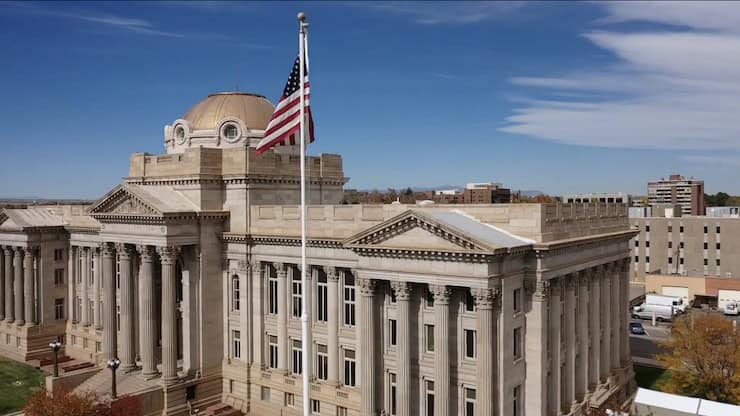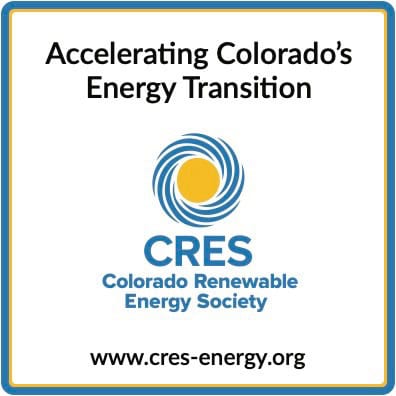Two county commissioners spar on what had been agreed to in filing with PUC and third commissioner is silent in the matter
by Allen Best
Velma Campbell, a physician in Pueblo specializing in public health, particularly occupational and environmental health, stood before the Pueblo County commissioners on Thursday morning and made a plea.
Would they immediately and emphatically repudiate the filing that had been made on their behalf the prior Friday to the Colorado Public Utilities Commission. In that filing to the PUC, Pueblo County had said they would seek the intervention of President Donald Trump to continue burning coal at the Comanche Generating Station.
Comanche 2 is scheduled to close at the end of 2025 while the final unit, Comanche 3, is to wind down operations but remain open through 2030.
While they were at it, added Campbell, would the commissioners adopt a resolution supporting the promotion of renewable energy and related industry?
The filing with the PUC on Aug. 29 said this:
“Pueblo County is in the process of requesting that President Trump and Secretary Wright order that Comanche 2 remain in operation beyond its closure date which is scheduled for the end of 2025 and further requesting that the capacity restrictions of Comanche 3 be removed and that he orders that Comanche 3 and 2 remain open until replacement generation is constructed in Pueblo.”
Campbell left without getting the repudiation of that statement that she sought and the resolution in support of renewable energy.
All three commissioners variously agreed that they were unhappy with how the PUC has handled Pueblo’s fate as it has considered what comes next for Xcel Energy, the operator and primary owner of the units. (CORE Electrical Cooperative and Holy Cross Energy own portions of Comanche 3).
Nobody denied that Pueblo’s future is in doubt. The Comanche Generation Station has been responsible for 10% of the county’s budget. Xcel Energy has promised to pay property taxes through 2040.
Zach Swearingen, the chair of the board, defended Pueblo’s role in clean energy. “I think that Pueblo County has done a lot more than almost anywhere else in the state when it comes to the promotion of clean energy and renewable energy,” he said. “And our testimony is not really heard.”
Commissioner Miles Lucero said he shared Swearingen’s frustration. “Whether you’re a nuclear fan, whether you’re a fan of the renewable energy park — none of those things were really considered in their recent ruling, and I think that’s where the frustration stems from.”
But Lucero had another frustration. “The language that was submitted (to the PUC) in its version was not presented to this board,” he said, “and to me, that is a massive procedural error.”
Commissioner Paula McPheeters said that what was in the PUC filing on Aug 29 did indeed reflect what the commissioners had said would be OK. “The filing was exactly what I wanted it to say,” she said. She she she remembered raising her hand and saying it needed to go to the federal level, she added.
Pueblo, she went on to say, is like being on a fourth floor of a four-alarm fire. “I want a 20-foot truck to come save us. I’m not willing to negotiate down to 10 feet, because we’re going to die if we don’t get help.”
Colorado, said McPheeters, has given “given us the shaft.” “We have functioning clean coal plants right now that are working. I would accept natural gas if we can get that, but the PUC has basically given us no options here. It is not my job to sit back and watch the building burn and do nothing.”
McPheeters said she had contacted Pueblo’s representative in Congress (Jeff Hurd).
“We were promised a just transition. We’re getting just nothing. I’m not going to sit back and let that happen.”
Lucero said that frustration with the PUC does not mean that Pueblo wants to stay the course with coal.
“I was disappointed, like you, Dr. Campbell, to see that frustration come through in a filing like that. Conversations about what replaces Comanche have never centered on keeping coal burning. They’ve always centered on what comes next for this community.”
The request to keep Comanche operating indefinitely, said Lucero, is “not accurate.”
Unclear is when the conversation between the commissioners and their legal counsel in the case occurred.
Without Swearingen, the third commissioner, supporting Campbell’s plea for a repudiation, the statement by Pueblo County in the PUC filing stands.
For the background to this conversation in Pueblo on Thursday morning, see this story from Wednesday: “Will Trump try to keep coal burning in Pueblo?”
Top photo: Pueblo County website
- Ridding Denver-area homes of gas - February 5, 2026
- Gearing up for data centers - February 3, 2026
- How Colorado sees the Colorado River stalemate - February 2, 2026







Good on Commissioner Paula McPheeters for the audacity to call on President Donald Trump and Congressman Jeff Hurd to intervene in Colorado’s complicated energy predicament. Particularly as it relates to the governor-appointed PUC and the governor’s office itself for giving Pueblo County the proverbial shaft on this so-called Just Transition Plan.
A just transition that assumes Xcel Energy, the owner and operator of the Comanche Generating Station, will reverse its decision to phase out the facility by the end of the decade is not realistic; instead, the situation reflects underlying political challenges and utter policy failures.
The sausage of electricity politics has been a recipe for disaster for Southeastern Colorado, particularly Pueblo County. Xcel Energy’s decision not to renew an agreement to sell power to Black Hills Energy years ago was the seedbed for the energy dilemma Pueblo and Southeastern Colorado are in now.
That fateful decision by Xcel set into motion the creation of costs for both utilities that they simply passed on to their customers in Southeastern Colorado as rate increases that are now looming large for the greater Denver metro area.
When Xcel pulled the plug on electricity sales to Pueblo, Black Hills simply sought regulatory rate review to recover costs for their compulsory investment in their natural gas-fired Pueblo Airport generating station, costing over half a billion dollars. Since then, for various reasons, Black Hills has laid upon their 100,000-plus ratepayers what are arguably the highest electricity rates in the state — and still climbing.
It is no wonder Boulder-based Leslie Glustrom is making this a calling for being a constant presence at the PUC concerning Xcel Energy’s Just Transition Plan to replace Pueblo’s coal-fired power plant, which should be converted to natural gas, a good bridge fuel that’s cleaner than coal, making it a step towards cleaner electricity generation.
Commissioner McPheeters should also call upon President Trump to keep his 2024 campaign promise to cut energy and electricity prices in half within 12 to 18 months. May as well have our President and our Congressman representing Colorado’s 3rd District help kill two so-called regulated utility birds with one stone. More importantly, to help rectify Colorado’s political and policy failures.